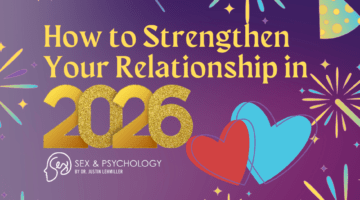Older Women Who Date Younger Men Are More Satisfied
October 7, 2019 by Justin Lehmiller
Relationships in which a woman is significantly older than her male partner have always attracted a lot of attention and scrutiny. Case in point: remember what big news it was when Demi Moore and Ashton Kutcher were together? Or the international media obsession that followed French president Emmanuel Macron and his spouse, Brigitte, who happens to be 24 years his senior?
This same scrutiny isn’t usually applied to relationships in which men are significantly older than their female partners. For example, former U.S. President Donald Trump happens to be 24 years older than Melania. Certainly, the Trumps have attracted a lot of media attention—it just hasn’t been for their age difference! Research on age-gap relationships bears out this double standard.
Specifically, people are more disapproving of male-female age-gap couples when the older partner is a women than they are when the older partner is a man [1]. In these woman-older relationships, the disapproval seems to be reserved primarily for the female partner. Indeed, while older women are commonly referred to as “cougars”—a term that implies a predatory nature—derogatory labels for the younger men who enter these relationships don’t really exist.
This strong bias against woman-older age-gap relationships probably helps to explain why they’re relatively rare. In fact, according to census data in the United States, just 1.3% of marriages featuring a man and a woman include a woman who is ten or more years older than her husband [2].
Given this double standard and social disapproval, can older women develop and maintain long-term, satisfying relationships with younger men? According to my own research on this topic, they most certainly can.
I surveyed approximately 200 heterosexual women in relationships, who happened to be about evenly divided between those who were significantly older than their male partners (22 years older on average), those who were significantly younger than their male partners (17 years younger on average), and those who were close in age to their partners (3 years different on average).
What I found was that women who were more than ten years older than their male partners were actually the most satisfied with and committed to their relationships compared to both women who were younger than their partners, as well as women whose partners were close in age [3].
Why were the older women happier with their relationships? I can’t say with certainty based on my data, but it may be because when the woman is older, it might shift the power dynamic toward greater equality. We know from a lot of research that greater equality in a relationship tends to make couples happier [4], so perhaps it’s the case that this arrangement is just more equitable.
Alternatively, maybe it’s not as much about equality as it is about putting women in a more dominant position. We know that a lot of men are into the idea of submitting to a dominant, powerful woman—and they tend to see older women as having those characteristics. After all, this is a big part of the reason why MILF-themed porn is so popular. So maybe it’s a feeling of empowerment that ultimately underlies older women’s greater feelings of satisfaction—and perhaps that empowerment allows women to get more of what they want, sexually and otherwise.
Although more research is needed, these results suggest that while age-gap couples featuring an older women and a younger man might face a lot of social resistance, this does not necessarily prevent them from developing strong, highly satisfying relationships.
Want to learn more about Sex and Psychology ? Click here for previous articles or follow the blog on Facebook (facebook.com/psychologyofsex), Twitter (@JustinLehmiller), or Reddit (reddit.com/r/psychologyofsex) to receive updates. You can also follow Dr. Lehmiller on YouTube and Instagram.
[1] Banks, C. A., & Arnold, P. (2001). Opinions towards sexual partners with a large age difference. Marriage & Family Review, 33, 5–18.
[2] U.S. Census Bureau. (1999). America’s families and living arrangements. Retrieved April 8, 2009 from: http://www.census.gov/population/www/ socdemo/hh-fam/p20-537_99
[3] Lehmiller, J. J., & Agnew, C. R. (2008). Commitment in age-gap heterosexual romantic relationships: A test of evolutionary and socio-cultural predictions. Psychology of Women Quarterly, 32, 74-82.
[4] Winn, K. I., Crawford, D. W., & Fischer, J. L. (1991). Equity and commitment in romance versus friendship. Journal of Social Behavior and Personality, 6, 301–314.
Image Credit: 123RF/Dmytro Zinkevych
You Might Also Like:
- Is There A Romeo & Juliet Effect? The Link Between Parental Interference And Relationship Quality
- What A Decade Of Data From Pornhub Reveals About Our Sexual Interests

Dr. Justin Lehmiller
Founder & Owner of Sex and PsychologyDr. Justin Lehmiller is a social psychologist and Research Fellow at The Kinsey Institute. He runs the Sex and Psychology blog and podcast and is author of the popular book Tell Me What You Want. Dr. Lehmiller is an award-winning educator, and a prolific researcher who has published more than 50 academic works.
Read full bio >


